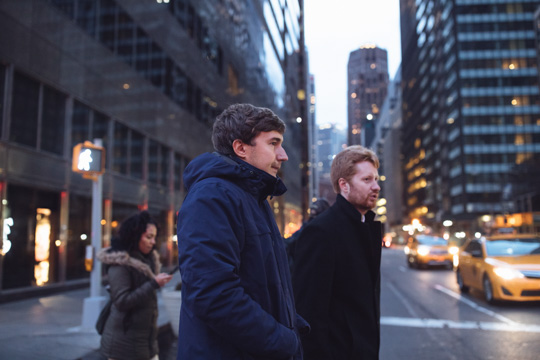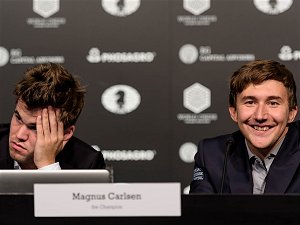The World Championship match in the Russian Chess press

Sergey Karjakin with his second Vladimir Potkin in New York - Photos: Max Avdeev
By Vera Jürgens
All in all, the Russian media thought that Magnus Carlsen deservedly won against challenger Sergey Karjakin. "Karjakin performed miracles in this match, just like the great magician Houdini", writes "Championat". However, Karjakin's passive play was criticized. The result was seen as just because it was impossible "to win a game if you do not at all play for a win."
In an interview with Radio Svoboda the 13. World Champion commented on Carlsen's win. He thought Karjakin's play to be inconspicuous. He was a strong grandmaster, but not more - in contrast to Magnus Carlsen who, according to Kasparov, had the qualities of a champion. According to Kasparov, Carlsen was basically better than Karjakin in all phases of the game.
In his customary outspoken way Kasparov said: "A World Champion Karjakin would have been a misunderstanding. After all, all 16 World Champions, starting with Steinitz, are remarkable players, and our chess world is proud of them. It would have been very strange indeed if a player such as Karjakin had outplayed an opponent of Carlsen's class. For such a sensation the stars in heaven really need to be in a seriously unusual constellation."
Kasparov shares the view of other observers that Carlsen had played below his usual level. However, Kasparov did not see political factors, which others had often conjured, at work in the match. "Karjakin has often revealed his loyalty to the regime of Putin. Sometimes he did this very aggressively. Magnus did not care much. There was no political background similar to that of Fischer-Spassky 1972, Karpov-Kortschnoi 1978 or the matches Karpov and I played."
.jpg)
The World Champion in the Dark Room, as the cabin was dubbed by observers
"Carlsen will play his main matches against younger players"
When asked whether he thinks that Carlsen has still potential to develop Kasparov said:
"Seven years ago I worked with Magnus and since then he has changed a lot. Even back then I knew that he had oustanding potential and now he has started to realize this potential. Magnus is 26 years old and still has to time to develop - particularly in regard to his mental strength. He should continually set himself new goals because chessplayers reach the peak of their career when they are about 30, if not earlier. It is difficult to say whether Magnus will improve further. If he gives it all - which he did not against Karjakin - he is phenomenally strong. But it is difficult to say whether his challengers of 2018 or 2020 will be able to beat him. Magnus will play his main matches against younger players. But in the next two or maybe even four years he still has the better chances."
Sergey Karjakin is still a hero in Russia
Many TV stations waited at the Sheremetyevo International Airport in Moscow for the arrival of Karjakin's flight from New York. The President of the Russian Chess Federation, Andrey Filatov, gave journalists a first statement:
"Victory was very close. But Sergey is still a hero. Oh, had he played the knight [in game 10], you would have celebrated us with the crown. But that does not matter, we have to look ahead. In two years time we will try to dethrone Carlsen. We still have Kramnik, Grischuk ... and of course Karjakin. Sergey won the hearts of the Americans and caused the World Champion to have a nervous breakdown - that means something. Carlsen showed weaknesses. His hands were trembling when he put up the pieces in the crucial game. That was after his win, when he tried very hard to appear very calm. We did not manage to adjust to the rapid tie-break, however, the Norwegian followed a clever strategy. Still: there is nothing we have to be ashamed of. Six million people from 206 countries followed the final online and that is a record!"
.jpg)
Magnus Carlsen during game 12, which was a short one
The Norwegian without a name
Sergey Karjakin also answered the questions of the journalists:
What will you do next?
I long to see my son Aleks. I have not seen him for more than 40 days. Just when he made his first steps. For me, this is a moving sight. As soon as I am home I will grab him. Then I will simply take time off and relax.
What did you think about during the flight to Russia?
I thought that a lot of people here have supported me. I am grateful to my coaches, my doctor, my fans, the sponsors, the chess federation. And I would like to thank the government, even our president was rooting for me. Thus I am very happy to return home where I am loved and people look forward to seeing me.
You mentioned how you were supported in New York, even the taxi drivers did not want your money. Did you really feel how the Americans were rooting for you?
Yes! Particularly so during the last days when the tension became almost unbearable and the tie-break had to decide everything. A whole army was rooting for me. I did not manage to defeat Carlsen but I showed good results. I was a worthy opponent for him and I am not ashamed to return home.
Do you already think about your next attempt to get the crown in two years time?
Of course. For a short time I will relax but then I will start to prepare. My goal is to win the Candidates again. After all, I have shown that I am a match for Magnus.
How did you say good bye to the Norwegian? Amicably? Or did the bitterness of defeat get in the way?
We have completely normal relations. We leave our anger at the chess board. I congratulated him to his birthday which he celebrated on the day he won the tie-break. But our duel is not over yet. I hope to have the last word.
In game 10 you had a chance to draw but you did not make an obvious knight move and eventually lost the game. Did you see the knight move?
I saw the move but fell into a psychological trap. Carlsen at all costs had to play for a win and I was certain that he would not make such primitive mistakes. Therefore I ignored this move. Perhaps I had too much respect for the Norwegian. I probably should have been a bit more audacious.
Everyone admired your defensive skills. Your love of soccer is also well-known. Would you be ready to advise the defenders of Spartak, your favorite team?
(Smiles) Yes, much more so after Spartak did not show in Samare what the team can do, to put it mildly.
Do you suffer a lot because you lost the match against Carlsen?
Well, you know, our match will enter the books, it will be analyzed. I am not ashamed. I believe I deserve a break of a few weeks. Then the World Championships in rapid and blitz are due, definitely not easy. You always have to keep in shape, otherwise you will no longer have success.
You gained a lot of rating points.
Yes, currently I am number six in the world. Before that I was number nine. However, I do not want to stay there forever.

A last look before the match: the Karjakins before game 11
Sources:
Translation from German into English: Johannes Fischer
Did you know...
... that ChessBase offers a DVD about Sergey Karjakin as a young talent? Lorin D'Costa shows how Karjakin became grandmaster and illustrates the strenghts of the young Karjakin with a lot of instructive examples.
 Chess Prodigies Uncovered: Chess Prodigies Uncovered:
Sergey Karjakin
Sergey Karjakin hit the headlines in 2002 when he became the world’s youngest ever grandmaster aged just 12 years 7 months, a record which shocked the chess world and still stands today. In the first of this new series with ChessBase, IM Lorin D’Costa investigates one of the most famous prodigies of modern times – Sergey Karjakin. In this DVD, D’Costa focuses mainly on Sergey’s early career from aspiring 9 year old up to grandmaster at 12, culminating in his current world top 10 status, and on who his rivals are for the title of world champion. Not many chess players can say they defeated a grandmaster at age 11, but Sergey did when he defeated Pavel Eljanov in the Ukrainian Team Championships in 2001, and from a level endgame at that! How did Sergey defeat one of the world’s best players, Alexei Shirov, with masterful precision at the age of just 12? How did Sergey grind down the reigning world champion Vladimir Kramnik in 2004 in an opposite coloured bishop ending in the Dortmund playoff aged just 14? Enjoy these and many other scintillating games, along with the new ChessBase interactive format of Question & Answer, to enjoy an interesting documentary about one of the strongest players in modern day chess and his road from young prodigy to grandmaster and beyond! Video running time: 5 hours.
| Language: |
English |
| ISBN: |
ISBN: 978-3-86681-379-3 |
| Delivery: |
Download, Post |
| Level: |
Beginner, Advanced, Tournament player |
|
Order Chess Prodigies Uncovered: Sergey Karjakin



















.jpg)
.jpg)

 Chess Prodigies Uncovered:
Chess Prodigies Uncovered:




